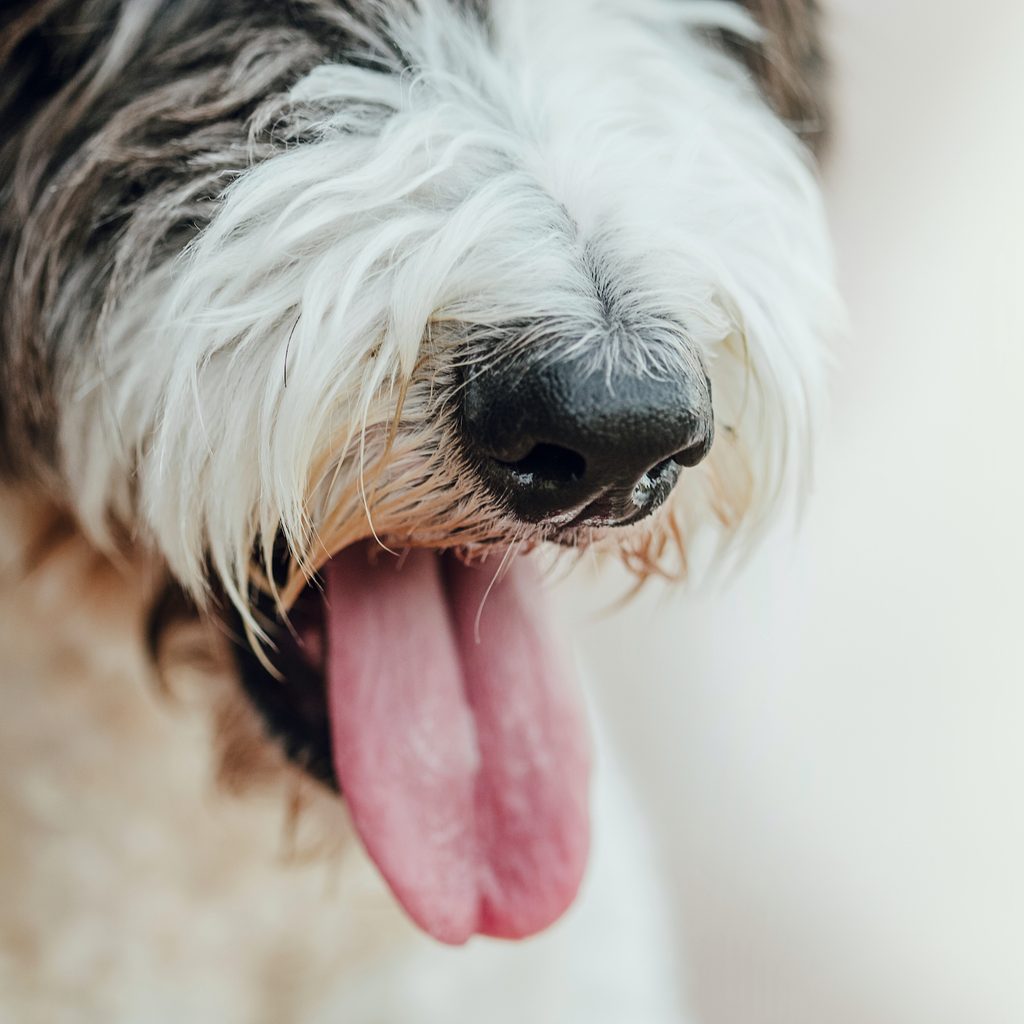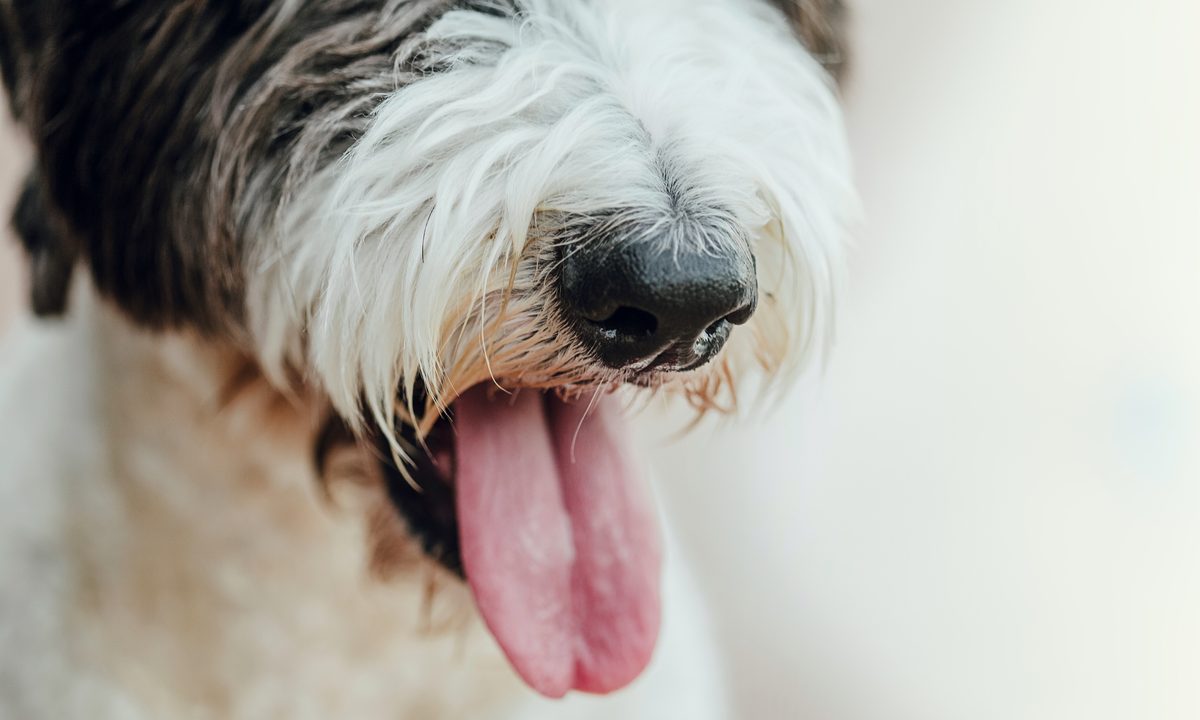Most of the time, panting is a perfectly normal behavior for dogs--but how do we know when it's a sign of injury or illness? If your pup starts panting outside of play, exercise, and cool-down periods, you may want to keep a closer eye on his health and behaviors.
We will answer questions like:
- Why is my dog panting?
- How much panting is too much?
- How can I help my dog stop panting?
Read on to learn everything you need to know about excessive panting in dogs, including when it is and isn’t normal. You've got this!

Why is my dog panting when not playing, exercising, or cooling off?
No pet parent likes to think about their baby being stressed or in pain, but that can be a reason for excessive or unexplained panting. As Texas Pet Vets explains, when a dog is upset or experiencing pain, their body releases cortisol — the stress hormone. A rise in cortisol often results in an increase in temperature, leading to panting as an effort to cool off.
This can happen when a dog is sick, too. Cushing’s disease is one illness that can raise cortisol levels, though panting can also result from fever. Respiratory illness may also give the appearance of panting, so it’s important to visit your vet to determine the root of the symptoms.

Why is my dog panting at night for no reason?
Since dogs pant to stay cool, it’s entirely possible that your furry friend is just too warm. If that’s not the case, though, you should pay close attention to any other behaviors to help identify the problem.
Some dogs, according to Purina, also experience anxiety at night, especially if they sleep away from their owner. While it may be separation anxiety, it can also be anxiety from traumatic past experiences, uncertainty with a new routine, or just worry.

How do I know if my dog is panting too much?
For most breeds, some amount of panting during exercise and excitement is normal, but you may notice some of these signs if your dog is panting too much:
- Breaths sounding louder, harsher, or raspier than usual
- Your dog exerts more effort than usual
- Panting longer than 20 minutes after exercise or while at rest
- Your dog seems stressed or lethargic
The best thing you can do for your pup is to give him a good look over, just to make sure you don’t miss any unusual symptoms or behaviors. Don’t hesitate to take your dog to the vet if anything seems out of sorts, as abnormal panting can sometimes be a sign of something more serious.

How to help a dog stop panting
No matter why your dog is panting, there are plenty of techniques you can use from home to help him calm or cool down:
Step 1: Offer your dog water.
If you suspect your dog’s condition may be heat-related, hydrating him may help. Although cool water can be especially beneficial, don’t use cold water, which can be a shock to the system and aggravate the problem. Offer water slowly and in small amounts to avoid lowering the body temperature too fast.
Step 2: Move to a cooler location.
Whether your dog is overstressed or overheated, moving to a cooler, darker location can help calm his body and mind. Again, make sure this new space isn’t too cold, as a gradual temperature decrease is the safest and most effective way to cool down a dog.
If your dog is feeling stressed, removing them from the space and situation can help them calm down and reset.
Step 3: Offer your dog a cool, damp cloth
Whether or not you can move to a cooler spot, you can try soaking a cloth in cool water. Experts recommend not covering a dog with the cloth--as this can actually trap heat--but instead placing it on the ground for your dog to stand on or lie on top of.
Alternatively, you can rub a damp cloth across your dog's body or use a spray bottle to wet your dog's underside, paws, or inside of their mouth (via AKC).
Step 4: Use white noise.
For dogs who experience nighttime anxiety, a white-noise machine can help. This is the same technique used to calm dogs during fireworks, as it can help disguise noises and also ease a canine mind (via Preventive Vet).
Help your dog get used to and make positive associations with white noise by playing it when he’s not stressed — after a good walk would be perfect.
Step 5: Set a routine.
Dogs are creatures of habit, and setting routines can be a great way to relieve some of their anxiety. If that’s what’s causing the panting, you both will feel a lot better once you help your pup understand a new schedule. Knowing when he’ll eat, get a potty break, and even when you’ll come home will help him relax, knowing his needs will be met.
Step 6: Comfort your pet.
If anxiety seems to be causing excessive panting, you can try to calm your dog in a few ways. Petting him in long, slow, gentle strokes can be calming, for example. You also can speak to your furry friend in a soft but normal voice to keep him comfortable. The best thing you can do is to find what's triggering his anxiety!
Step 7: Call your vet.
If you believe you are dealing with something more than regular, exercise-induced panting, let your veterinarian know right away. They can help you decide whether to bring your pup in or monitor the symptoms at home.

If your dog is panting because of heat, look for these signs of heatstroke
Oftentimes, excessive panting is a sign of heat exhaustion or heat stroke in dogs. Your first hint might be warm weather, but you may also notice some of these signs of canine heat stroke that the AKC lists:
- Loud or rapid breathing
- Extreme thirst
- High body temperature (103 degrees Fahrenheit)
- Weakness, fatigue, or confusion
- Heavy drooling or thick saliva
- Vomiting
- Dark or bright red gums and tongue
- Breathing difficulty
- Rapid heartbeat
- Change in behavior, most usually agitation
Many of these symptoms are also signs of dehydration, though you can also check the skin around your dog's muzzle or neck. If the 'skin doesn't snap back when pinched' your pup needs some extra water.
When in doubt, call your vet! They’re there to help, whether you end up bringing your dog in or not. At the least, they can share some helpful ways to prevent excessive panting moving forward or recommend a way to keep your pup calm in the moment. Good luck, pup parents!




